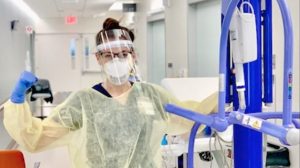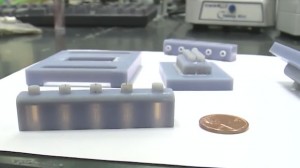NEW YORK (Reuters Health) – Patients with an acute exacerbation of chronic obstructive pulmonary disease (COPD) receiving invasive or noninvasive mechanical ventilation benefit from systemic corticosteroid therapy, a rare randomized controlled trial in this critically ill patient population confirms.
Compared with placebo, corticosteroid therapy resulted in shorter time on mechanical ventilation and in intensive care. Additionally, for patients initially requiring non-invasive ventilation, corticosteroids eliminated the need for rescue mechanical ventilation.
Dr. Inmaculada Alia, from Hospital Universitario de Getafe in Spain and colleagues report their study in Archives of Internal Medicine November 28.
The co-authors of a linked commentary say the one-day difference that the researchers observed in intensive care unit (ICU) stay is “certainly clinically significant.”
Given the “economic burden” of acute COPD exacerbations, reducing time spent in the ICU, and the need for rescue mechanical ventilation, can lead to “substantial savings,” write Drs. Andrew Shorr and Chee Chan from the Pulmonary and Critical Care Medicine Section, Washington Hospital Center and Georgetown University in Washington, D.C.
Roughly 10% of patients with acute exacerbations of COPD need mechanical ventilation. Yet studies assessing the effect of corticosteroid therapy on COPD exacerbations have excluded those requiring mechanical ventilation or admitted to the ICU because they are prone to complications potentially associated with corticosteroids, such as infections, hyperglycemia and ICU-acquired paresis.
Undeterred, Dr. Alia and colleagues performed a double-blind, placebo-controlled trial in 83 patients with an acute exacerbation of COPD who were receiving invasive or non-invasive mechanical ventilation. Participants were randomly assigned to receive intravenous methylprednisolone (0.5 mg/kg every 6 hours for 72 hours, 0.5 mg/kg every 12 hours on days 4 through 6, and 0.5 mg/kg/d on days 7 through 10) or placebo.
The groups were well-matched in terms of demographics, severity of illness, reasons for COPD exacerbation, gas exchange variables and corticosteroid rescue treatment.
Receipt of corticosteroids led to a significant reduction in the median duration of mechanical ventilation (3 days vs 4 days; P = 0.04); a trend toward a shorter median length of ICU stay (6 days vs 7 days; P = 0.09); and a significant reduction in the rate of failure of noninvasive mechanical ventilation (0% vs 37%; P = 0.04).
Importantly, say the investigators, giving systemic corticosteroids to this critically ill group of patients did not appear to raise the risk of gastrointestinal bleeding, superinfections, psychiatric disorders, or acquired neuromuscular weakness.
The major complication was hyperglycemia, a well-known consequence of corticosteroid therapy. However, it had no unfavorable clinical consequences in this study, the researchers say.
Dr. Alia and colleagues acknowledge that these findings “may not have a great impact on the current clinical treatment of ICU patients with COPD exacerbations because most of them are probably treated with corticosteroids.”
However, the results “do provide strong evidence of the beneficial effects of systemic corticosteroid therapy on clinically relevant outcomes in a patient population that has never previously been enrolled in a clinical trial,” they say.
Drs. Shorr and Chan say the findings are “important,” noting that “few researchers venture into the ICU for clinical trials. As a consequence, intensivists are often left extrapolating data from non-critically ill patients.”
However, they suggest that equipoise – the concept that there must be uncertainty as to the relative benefit of the intervention(s) under evaluation – was “at least potentially in question for the current trial.”
“If clinical trials of what are considered standard treatments are to be conducted…they must be performed with full consideration of equipoise,” they contend.Reference:
Arch Intern Med 2011;171:1939-1948




